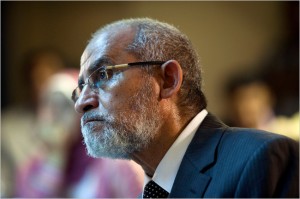Brotherhood boycott?
Parliamentary elections are coming up this fall in Egypt, probably in October or November. But the opposition and ruling National Democratic Party alike have their eyes on presidential succession, assuming that President Hosni Mubarak, who is ill and has ruled for 29 years, probably won’t run again in 2011. In that light, the parliamentary elections have become part of the broader political jockeying.
The Muslim Brotherhood commands by far and away the strongest street support among the opposition factions, but it’s a banned society whose parliamentary representatives are technically independents. Meanwhile, the secular opposition parties want to boycott the parliamentary elections to protest the ruling party’s heavy-handed manipulation of the voting process (since the last election, for instance, the government has cancelled the judiciary’s right to oversee polling stations). That’s the Brotherhood’s Supreme Guide Mohammed Badie in the picture, getting yelled at by secular opposition leaders during an iftar.
The Brotherhood and the secular National Association for Change are circulating a petition calling on the government to amend the constitution and reform the voting process to allow free and fair elections. It’s a rare instance of the Islamist and secular opposition working together, but even in this arena they’re competing to show who’s stronger. The Brotherhood has collected nearly 700,000 signatures; the National Association for Change only 100,000. You can follow the dueling signature drives on the Brotherhood petition page and the NAC petition page.
You can also read more about the Brotherhood’s internal debate between seeking power and challenging it in my story today in The New York Times.
CAIRO — One by one, the guests at the Muslim Brotherhood’s annual Ramadan iftar banquet strode to the rostrum. A who’s who ofEgypt’s opposition began hectoring the Islamist group. The Brotherhood, they said, by far the most muscular and influential of Egypt’s dissident organizations, should withdraw from the coming parliamentary election that would most certainly be rigged by the authoritarian government.
“Why won’t you take the initiative?” shouted Karima El-Hefnawi, a secular activist and leader of the popular Kifaya protest movement. “Why won’t the Muslim Brotherhood boycott this farce?” The supreme guide of the Brotherhood, Mohammed Badie, sat uncomfortably a few feet to her right.
At the close of the evening, Mr. Badie was noncommittal. The Brotherhood, he said, in time would make up its mind: “Haste makes waste.”
The Muslim Brotherhood is engaged in a delicate dance. Despite all efforts to marginalize the Islamist organization by the United States and its close ally, the Egyptian government, it remains the most credible opposition group. Some of its members want the Brotherhood to fight the government head on, but the Islamist leadership has other goals: freedom to proselytize and organize in neighborhoods, and in the long term, a lifting of the official government ban on its activities.
With an end in sight to President Hosni Mubarak’s 29-year reign, the Brotherhood appears to be signaling its willingness to cut a deal with Mr. Mubarak’s potential successors by not overtly challenging the ruling party’s monopoly on power.


